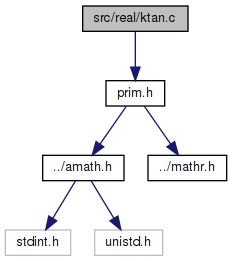Kernel tan function. More...
#include "prim.h"
Include dependency graph for ktan.c:

Go to the source code of this file.
Macros | |
| #define | one xxx[13] |
| #define | pio4 xxx[14] |
| #define | pio4lo xxx[15] |
| #define | T xxx |
Functions | |
| double | __kernel_tan (double x, double y, int iy) |
| Kernel tan function. More... | |
Variables | |
| static const double | xxx [] |
Detailed Description
Kernel tan function.
Definition in file ktan.c.
Macro Definition Documentation
◆ one
◆ pio4
◆ pio4lo
◆ T
Function Documentation
◆ __kernel_tan()
| double __kernel_tan | ( | double | x, |
| double | y, | ||
| int | iy | ||
| ) |
Kernel tan function.
Kernel tan function on [-pi/4, pi/4], pi/4 ~ 0.7854 Input x is assumed to be bounded by ~pi/4 in magnitude. Input y is the tail of x. Input k indicates whether tan (if k = 1) or -1/tan (if k = -1) is returned.
Algorithm
1. Since tan(-x) = -tan(x), we need only to consider positive x.
2. if x < 2^-28 (hx<0x3e300000 0), return x with inexact if x!=0.
3. tan(x) is approximated by a odd polynomial of degree 27 on
[0,0.67434]
3 27
tan(x) ~ x + T1*x + ... + T13*x
where
|tan(x) 2 4 26 | -59.2
|----- - (1+T1*x +T2*x +.... +T13*x )| <= 2
| x |
Note: tan(x+y) = tan(x) + tan'(x)*y
~ tan(x) + (1+x*x)*y
Therefore, for better accuracy in computing tan(x+y), let
3 2 2 2 2
r = x *(T2+x *(T3+x *(...+x *(T12+x *T13))))
then
3 2
tan(x+y) = x + (T1*x + (x *(r+y)+y)) 4. For x in [0.67434,pi/4], let y = pi/4 - x, then
tan(x) = tan(pi/4-y) = (1-tan(y))/(1+tan(y))
= 1 - 2*(tan(y) - (tan(y)^2)/(1+tan(y)))
Definition at line 108 of file ktan.c.
References fabs().
Referenced by tan().
#define GET_HIGH_WORD(i, d)
Get the more significant 32 bit int from a double.
Definition: prim.h:167
#define SET_LOW_WORD(d, v)
Set the less significant 32 bits of a double from an int.
Definition: prim.h:209
Here is the call graph for this function:

Here is the caller graph for this function:

Variable Documentation
◆ xxx
|
static |
Initial value:
= {
3.33333333333334091986e-01,
1.33333333333201242699e-01,
5.39682539762260521377e-02,
2.18694882948595424599e-02,
8.86323982359930005737e-03,
3.59207910759131235356e-03,
1.45620945432529025516e-03,
5.88041240820264096874e-04,
2.46463134818469906812e-04,
7.81794442939557092300e-05,
7.14072491382608190305e-05,
-1.85586374855275456654e-05,
2.59073051863633712884e-05,
1.00000000000000000000e+00,
7.85398163397448278999e-01,
3.06161699786838301793e-17
}
